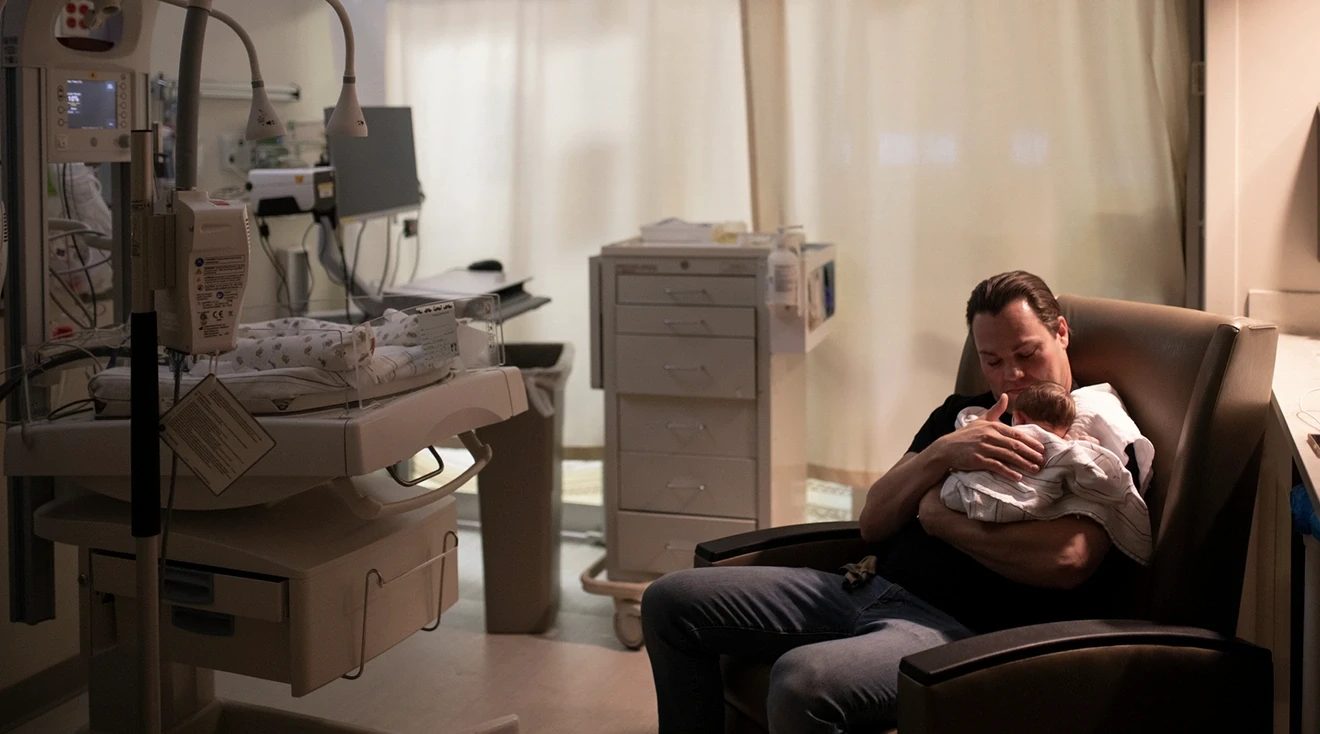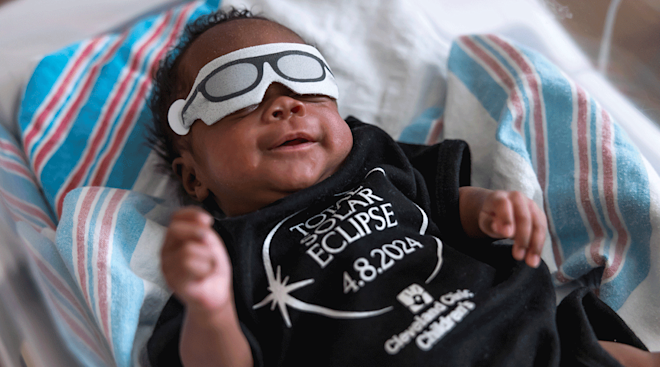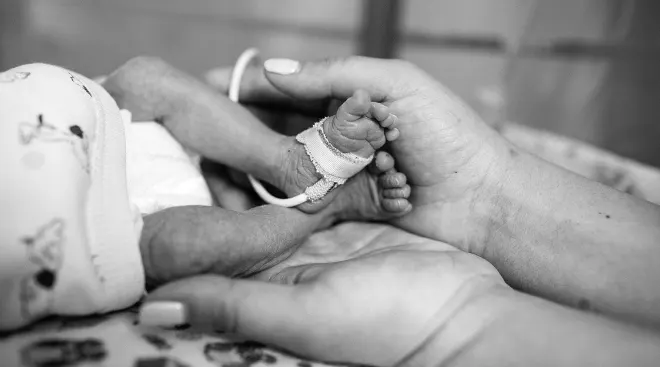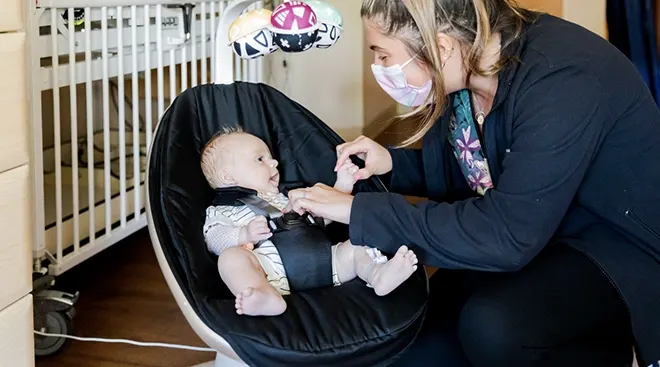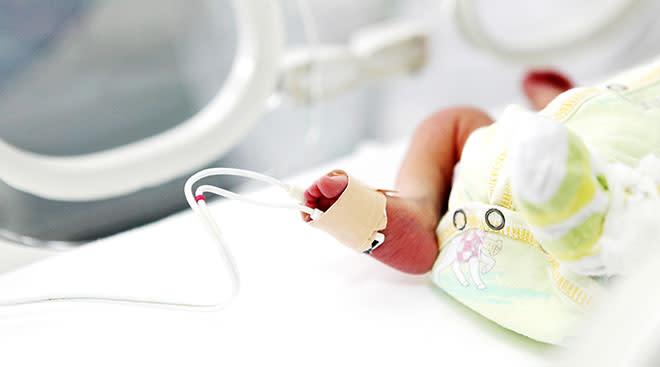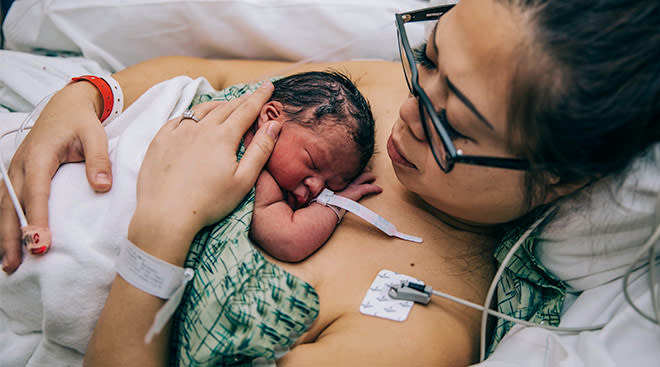A Parents’ Guide to Surviving the NICU
Having a baby in the neonatal intensive care unit (NICU) is a heart-wrenching, anxiety-inducing, exhausting experience no family wants to go through. And yet every day, whether because they’re born prematurely, underweight or with other health complications, babies enter this world needing additional intensive care—and parents find themselves visiting their newborns in the NICU instead of heading home together. While that fact may not lessen the blow, it does mean you’re not alone. To help you navigate the intensive care unit and all the emotional stress it can bring, we’ve tapped the experts—both neonatal specialists and parents who’ve lived through it—for their top tips on how to make it through the NICU experience.
The most important thing to remember when it comes to NICU care is that each baby, family, circumstance and NICU care center is different. It can be incredibly difficult to have baby in the NICU following birth, but the best way to get through it is to ask questions about baby’s unique situation, inquire about your hospital’s policies and keep the lines of communication open with baby’s providers. Here’s a basic run-down of what to know about a potential NICU stay.
Levels of NICU care
According to MariEllen Suarez, RN, a neonatal nurse with Prisma Health in Greenville, South Carolina, there are four different levels of NICU care: one being the most basic, and four being the most intensive. NICU parents commonly hear the terms “intensive” or “intermediate,” and this refers to the level of care baby needs. “Most babies admitted to the NICU have an intensive status,” Suarez says. “Once they are more stable and require less medical intervention (i.e. respiratory support or medication drips), they’re moved to intermediate status.” She breaks down the different levels below:
- Level 1: This is not actually a NICU, but rather the broader baby nursery offering basic newborn care. “They usually don’t care for babies born before 35 weeks gestation,” Suarez says.
- Level 2: Suarez describes this as “an intermediate care level,” as they serve newborns who are sick, premature, may need help eating and may need temperature regulation, but are otherwise in stable condition. “They’ll take care of babies with IVs, central lines and respiratory support.”
- Level 3: This level cares for babies that are more critically ill or premature, Suarez says.
- Level 4: Level four is reserved for newborns who are extremely ill, in critical condition and/or require major surgeries, Suarez says, such as heart and lung bypass or ECMO (extracorporeal membrane oxygenation).
The NICU team
The NICU can be a very overwhelming place. Understanding the different roles of the medical professionals on baby’s care team can help you know who to seek out for answers and guidance. According to Stanford Children’s Hospital and March of Dimes, each provider on the team is responsible for a specific aspect of baby’s care. These providers may include:
- Neonatologists: These are pediatricians specially trained to take care of preemies and sick newborns.
- Neonatal fellow: These are pediatricians currently receiving extra training in NICU care.
- Pediatric resident: These are doctors completing their pediatric training during their residency (following their graduation from medical school).
- Neonatal nurse practitioner (NNP): These are registered nurses with higher levels of education and training in neonatal care.
- Registered nurse: A registered nurse has the education and training required to give medical care.
- Respiratory therapist: These professionals are trained to provide respiratory support and manage breathing and oxygen machines.
- Physical, occupational and speech therapists: They help ensure baby’s physical and oral development is on track.
- Pharmacists: They help ensure baby’s getting the best medicines for their needs, check dosage levels and inform the rest of the care team of possible side effects (and consequential monitoring that may be required).
- Social workers: They can help families cope with having a baby in the NICU by providing emotional support, as well as help with logistics, like transportation and finances.
NICU machines and medical equipment
“There are a lot of machines and sounds in the NICU that most people have never seen or heard before,” Suarez says. It’s hard to see baby hooked up to so many machines, but understanding what they do can help provide comfort and agency. To help baby breathe, parents may see respiratory machines such as a ventilator, bubble CPAP or nasal cannula. To help keep baby warm and their body temperature regulated, a radiant warmer, Giraffe isolette, Drager isolette, open crib or cooling blanket may be used, depending on baby’s condition and how much humidity they need. You may also see IV pumps that control baby’s medication and fluid intake, as well as a feeding pump, which will help feed baby until they can eat through their mouth.
If your newborn is admitted to the NICU, your hospital will likely provide you with a welcome packet introducing you to the unit and basic information about the policies, procedures and people you should know (remember this will vary from center to center). That can include everything from the NICU rules about visitation to who will be taking care of your child to key medical terms you’ll likely hear and what they mean.
If you happen to know before birth that baby will likely need to be admitted to the NICU, consider scheduling a tour of the unit beforehand. During that consultation, you’ll be able to see the facility and meet with physicians to familiarize yourself with how the NICU operates and who will be caring for your newborn. “It’s stressful to have a baby and then not be able to have them stay with you,” says Jennifer Phelan, RN, NICU patient educator at Banner Thunderbird Medical Center in Glendale, Arizona. “When they’re admitted, already having that knowledge of the NICU behind you is powerful.”
Regardless of whether baby’s NICU stay is anticipated or wholly unexpected, don’t hesitate to ask questions and gather as much information as you can. There will be a lot to absorb—but knowing what is and isn’t possible can make your experience that much easier.
Learn about visitation rules
Most NICUs now practice what’s known as family-centered care—meaning doctors want parents to be involved in baby’s care, day or night. “It’s a whole shift compared to the early 1990s. Now, as far as parents are concerned, we welcome them 24 hours a day, no restrictions,” says Pradeep Mally, MD, division director of neonatology at Hassenfeld Children’s Hospital at NYU Langone in New York City. Still, there are guidelines to keep in mind. Some units only allow two people at baby’s bedside at once, and one must be a parent. Siblings might have to be at least 2 years old and fully vaccinated, and during cold and flu season, those under 13 may not be allowed in the NICU at all for fear of spreading infection.
Of course, even if parents are welcome to stop by the NICU 24/7, sometimes their situations don’t allow for frequent visits, whether it’s due to work schedules or lengthy commutes. It’s worth asking the hospital about video-chatting setups. Some will hook you up with access to Skype, Phelan says, while others have individual web cams in the unit so parents can log on and see their baby whenever they want. And know that you can always call the NICU to check up on your little one. “If you wake up at 2 a.m. and feel like you need to call, call! It’s not like a pediatrician’s office where you have to wait until 8 a.m.,” Phelan says. “Just remember that it may take us a few minutes to take the call, or we might have to call you back if we’re in the middle of care.”
Suarez says that most COVID restrictions have been relaxed in NICUs, including the requirement to wear masks, gloves and gowns (of course, there are specific circumstances related to infection prevention). That said, it’s always best to check with NICU staff on their specific policies.
Brush up on NICU etiquette
Every unit has different policies in place, but there are some general rules of thumb to know when it comes to NICU etiquette. “The most important thing: hand washing,” Mally says. “It’s everybody’s responsibility. At every station there is Purell and sinks for hand-washing. Each time parents come into the NICU they have to wash their hands, and after putting baby back, they should wash their hands again.”
Also, it’s common courtesy within the NICU to avoid looking at (or taking pictures of) other people’s babies, and keep your questions focused on your own child. Given that NICUs are often laid out as open bays—meaning there are several incubators grouped in one open area—it can be hard to keep your eye from wandering. But while interacting with other parents is allowed and encouraged, hospitals strive to protect patient privacy.
Other etiquette rules to keep in mind: Food and drinks are usually not allowed in the NICU. Same goes for cell phones, since they can disrupt the monitors. And if you or your guests aren’t feeling well, it’s best to stay away or let the staff know, since shielding NICU babies from infection is a top concern.
Participate in rounds
Every day, a team of doctors will do patient rounds to discuss each baby’s condition and care—and parents are encouraged to participate! “Right from day one, we give parents the chance to feel a part of this. We’re all in this together,” Mally says. “It really helps parents emotionally so they don’t feed helpless.” Ask what time rounds will take place and plan on being there. It’s a unique opportunity to hear how baby’s doing, ask questions and pipe up with any concerns. “Sometimes it will feel like you have no control, but always remember this is your baby and your voice does matter,” Suarez says.
Bump user kaylaaimee echoes this: “Don’t be afraid to voice your opinion or ask your doctor questions,” she urges. “It’s easy to feel as though your role as a parent has been taken from you when you’re in the NICU, with nurses tending to your baby round the clock and doctors calling all the shots. It’s also easy to feel intimidated. Many NICU moms feel as though if they question something, it might prevent their baby from getting the best care. The truth is, NICU doctors and nurses are happy to see parents be very involved in their children’s care. Once I let it be known that I wanted to know everything I could and be as involved as possible, our doctors were wonderfully accommodating, even showing me how to read my daughter’s chart and daily X-rays so I could watch her progress.”
Get hands-on with baby’s care
Doctors and nurses will be tending to baby around the clock—but that doesn’t mean you can’t ask to perform some tasks yourself. Of course, depending on baby’s condition, certain things will need to be left to the pros, but if your child is stable enough, you may be able to do things like change baby’s diaper, bottle-feed, bathe them and more. “None of the nurses told me that I could…give baby his baths or take his temperature. These are all things I learned online—some of them too late,” Bump user urbanflower says. “The NICU feels overwhelming and is a very controlled atmosphere, so you might not think of these tasks as yours to do whenever you want.” The takeaway: Ask how you can get involved!
That’s especially true when it comes to skin-to-skin contact. There are tons of benefits to holding baby directly against your chest: It can help regulate baby’s body temperature, improve vital signs like heart rate and breathing, soothe cries, encourage good sleep patterns, promote parent-child bonding and make breastfeeding easier. “As soon as we think the patient is stable enough—even if they’re on a ventilator—we encourage skin-to-skin care, for both [parents],” Mally says. Bump user MommynTeach says, “Kangaroo care is a must! Ask when baby is stable enough to hold them skin-to-skin. It’s a tremendous bonding experience for the two of you, and is proven to help babies in many, many ways. Plus, it feels fantastic to hold baby so close.”
When you can’t be by baby’s side, there’s still a way you can help your newborn feel close to you. At Banner Thunderbird Medical Center, Phelan says moms are encouraged to pin fabric hearts on their shirts so their scent permeates the fabric. The heart is then placed in baby’s incubator. Some parents even drop a little breast milk onto the fabric. “That way you at least know you’re leaving a piece of you in that Isolette,” she says.
Personalize baby’s space
Certain personal items, like stuffed animals and flowers aren’t allowed, as they could inhibit the monitors or pose respiratory problems, Suarez says. But other items, like books and photos, may be allowed (again, check with your NICU staff to confirm!). “We always put up pictures that parents bring in and display books on the shelves.” You can also bring baby pacifiers, blankets and clothes—“just always make sure to label the item so that it doesn’t get thrown in with the NICU laundry,” she adds.
Ask about sleeping accommodations
One of the hardest things about having a baby in the NICU is being separated from your child. While Mom recuperates from birth, she can’t have baby next to her in her hospital room, and when she’s discharged, she often has to head home without baby. It’s not an easy thing for any parent—but for those who don’t live close to the hospital, it can pose a significant emotional and logistical challenge. Ask what resources the hospital has to offer. Some NICUs now have a handful of private rooms, where a parent can stay overnight next to their child. Babies who are close to being discharged may be placed in special apartment-like rooms, sometimes called “nesting rooms” or “launch pads,” so parents can stay overnight and get used to caring for baby on their own. Some offer parent lounge areas that are equipped with pull-out cots and showers. Occasionally, if the hospital isn’t at capacity, they’ll let moms stay in an open bed on the postpartum floor or elsewhere in the facility. And if private rooms or open beds aren’t an option, social workers can help families arrange stays at a local Ronald McDonald House or even negotiate a discount at a nearby hotel.
Take advantage of breastfeeding support
Breastfeeding for any new mom can be a challenge, but when baby is in the NICU, it can be particularly difficult. Preterm babies may not be developmentally ready to latch for a number of weeks. Ask to speak with a hospital lactation consultant right away. They’ll help you learn to breastfeed, if baby is up for it, or walk you through the process of pumping breast milk. The NICU can provide you with a hospital-grade double electric pump, a place to express milk and syringes or breast milk bags to collect that liquid gold, which is then labeled and stored in a special refrigerator and warmed by the nurses when it’s time for baby to eat. Pro tip: “Buy a pumping bra immediately. Don’t wait,” says Bump user iristony. “It’ll be so liberating to be able to pump and also send emails, read a book or research online while pumping—or actually catch up on a phone call!”
Another wonderful perk some hospitals offer breastfeeding moms: Free meals! As a nursing mom, it’s important for you to eat a nutritious diet, so you may be able to order breakfast, lunch and/or dinner, even after you’re discharged from the postpartum floor.
Having a baby in the NICU is a seriously stressful experience, regardless of how severe your child’s condition is. Simply put, there’s a lot to deal with. You’re consumed with concern for your child. The logistics of visiting the NICU are draining, whether you’re crashing on the parent lounge couches or commuting in when you can. The constant beeps, bells and alarms going off in the NICU are enough to drive anyone to the brink of sanity. And don’t forget the recovery from childbirth that every new mom has to contend with! Luckily, there are lots of support structures out there for parents with babies in the NICU. For help coping with the emotional toll of it all, here’s what the experts recommend.
Learn more about baby’s condition
“When you have a baby in the NICU, the anxiety level is high. It’s worse when you don’t understand baby’s disease,” Mally says. “It’s difficult to process what the physicians and nurses are trying to say, and a feeling of helplessness makes your experience worse.” So arm yourself with knowledge. But instead of asking Dr. Google (“there’s so much unfiltered information out there, it can send you into a tailspin,” Mally cautions), ask NICU staff for informational packets or recommended websites where you can learn more about baby’s condition. “When parents finally get a grasp of what the disease is, there’s more of a sense of ease,” Mally adds. “They understand what ailments their baby will outgrow, what questions to ask and how to be more active in rounds, and gain a greater sense of autonomy.”
Ask about hospital resources
Hospitals have social workers on staff who spend a lot of time talking with parents of NICU babies to help understand their challenges and concerns and manage any collateral stresses at home, Mally says. But be sure to ask what other support structures are in place. Some units have parent meditation rooms, hospital-organized parent-peer groups where parents of NICU graduates come back to volunteer and more. Every hospital has different services, so learn what’s available to you. “I tend to say, you got to become part of our NICU family—not that you wanted to,” Phelan says. “We’re here to take the best care possible of your baby and your family. You need to let us know how we can be the best family we can be.”
Join a parent support group
Beyond any peer groups run by the hospital, there are many community resources you can tap outside of the NICU. Look for a closed Facebook group for families of NICU babies, where parents skip the medical talk and focus on emotional support. “Chat with other parents! It’s nice to hear what others are going through,” Bump user JeepersWife says. “To this day, I’m still friends with another mom and a nurse my son had.” There are also parent-run support groups, where people meet up for coffee or play dates once their children are out of the NICU. After all, “Parents don’t just need support in the NICU, they need it after too,” Phelan says.
Take care of yourself
“I always tell the moms: They have to take care of themselves,” Mally says. “It sometimes gets lost in the shuffle. The amount of stress they endure during this whole process is unimaginable. But they have to sleep well and take care of their nutrition. They may be breastfeeding and doing skin-to-skin care. When the mom is highly anxious, it translates to what’s happening with baby. Babies are extremely smart and can sense parents’ anxiety. So taking care of yourself is important for baby’s health as well as the parent’s health.”
Make sure to eat well, get some sleep and take time for yourself. “Don’t feel guilty if you’re not spending every waking minute in the NICU. You need time for you (and your partner!) too,” says The Bump user pinotgirl.
JeepersWife agrees. “Take time to recover,” she says. “After being discharged I wanted to spend every waking moment back at the hospital and therefore wouldn’t take my meds or rest as I was supposed to. This resulted in a longer healing time.’
Celebrate the wins
When the going is tough, it’s important to recognize the steps forward. As Bump user appylovee says, “Celebrate all of the good. One ounce gained is amazing.” And while it can be upsetting to see your newborn hooked up to a multitude of monitors, don’t forget to revel in the arrival of your child. “Take lots of pictures and videos,” Bump user jacquez recommends. “You may not think you’ll want to remember these tough days/weeks/months, but being able to look back and see how far baby has come is amazing.”
Communicate with loved ones
Having your newborn in the NICU is already challenging, and having well-meaning loved ones ask about baby’s condition can make it even harder. If you prefer not to talk about it, make that clear, and, instead, politely let them know how they can best support you during this time—whether it’s offering to pick up groceries, bringing over meals or providing childcare for any older children.
Open up about your feelings
Whether it’s with your partner, family, friends, other NICU parents or a professional, it’s important to talk through what you’re feeling. It’s a heavy load, and the last thing you want is the weight of it all to become too much. “Write in a journal about your feelings and baby’s milestones,” suggests Bump user jcsntms06. And don’t underestimate the value of a good cry. As AlwaysSunny says, “It’s not just okay—it’s good for you to cry.”
Please note: The Bump and the materials and information it contains are not intended to, and do not constitute, medical or other health advice or diagnosis and should not be used as such. You should always consult with a qualified physician or health professional about your specific circumstances.
Plus, more from The Bump:
Pradeep Mally, MD, is the division director of neonatology at Hassenfeld Children’s Hospital at NYU Langone in New York City. He earned his medical degree and completed his residency at Kasturba Medical College in India. He completed an additional residency in pediatrics at Maimonides Medical Center in New York City.
Jennifer Phelan, RN, is a NICU patient educator at Banner Thunderbird Medical Center in Glendale, Arizona.
MariEllen Suarez, RN, is a neonatal nurse with Prisma Health in Greenville, South Carolina. She received her bachelor’s and nursing degree from Massachusetts College of Pharmacy and Health Sciences.
Stanford Medicine Children’s Health, The Neonatal Intensive Care Unit (NICU), 2023
March of Dimes, Your Baby’s NICU Stay, January 2019
Learn how we ensure the accuracy of our content through our editorial and medical review process.
Navigate forward to interact with the calendar and select a date. Press the question mark key to get the keyboard shortcuts for changing dates.

































